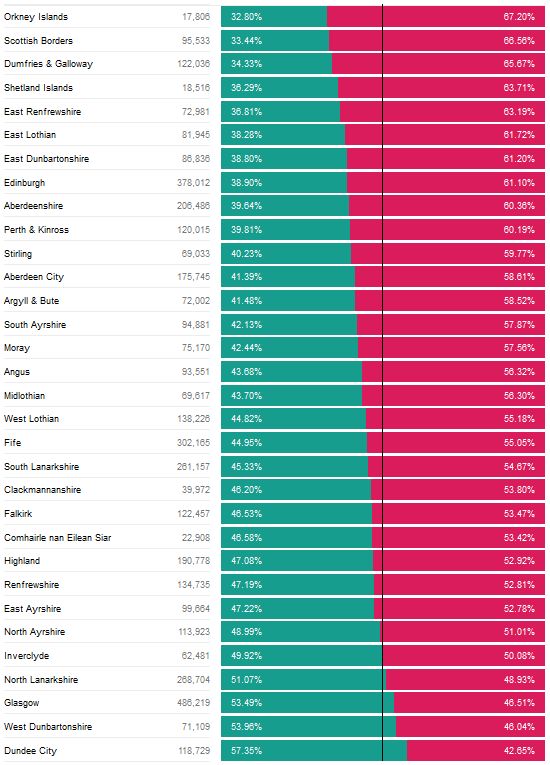What future Scotland?
“If at any time I announce that a nation or kingdom is to be uprooted, torn down and destroyed, and if that nation I warned repents of its evil, then I will relent and not inflict on it the disaster I had planned.
And if at another time I announce that a nation or kingdom is to be built up and planted, and if it does evil in my sight and does not obey me, then I will reconsider the good I had intended to do for it.
'This is what the Lord says: Look! I am preparing a disaster for you and devising a plan against you. So turn from your evil ways, each one of you, and reform your ways and your actions.' But they will reply, 'It's no use. We will continue with our own plans; each of us will follow the stubbornness of his evil heart.' " (Jeremiah18:7-11)
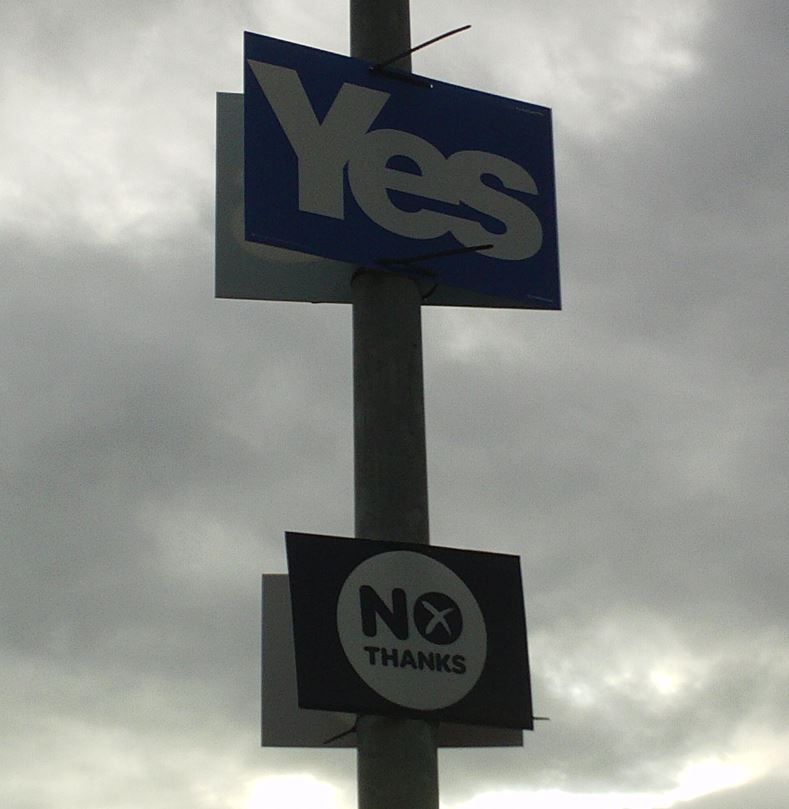 I was born in Scotland and have lived in the Scottish Highlands for all of my life. I regard patriotism and nationalism as two quite different concepts. The first is infused with affection, the second is often saturated in blood.
I was born in Scotland and have lived in the Scottish Highlands for all of my life. I regard patriotism and nationalism as two quite different concepts. The first is infused with affection, the second is often saturated in blood.
A call from out of the blue
Around a decade ago my telephone rang one afternoon. On the other end of the line was a lady whom I did not know; neither did she know me. We had never met, we have never met since and she and we have never been in touch again.
She explained her background and the reason for her call. She was Irish, but now living in London; of a religious background (in her case, Roman Catholic) but now thoroughly born again of the Spirit of God. Although living in England the Lord had given her a heart to pray for Scotland. So, as she further explained, she had to ask a Scot. Her question to me was as succinct as it was profound: “What do I pray for Scotland?”
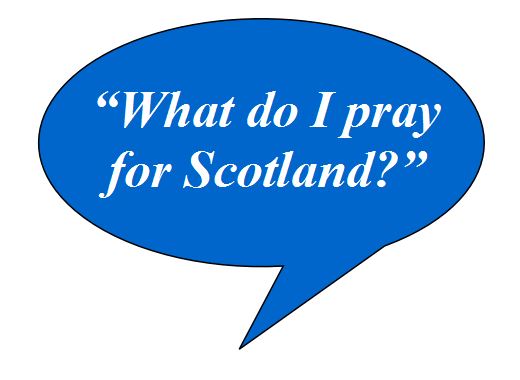
What indeed should she pray for Scotland? But her earnest request, arriving out of a clear blue sky, required a considered response. How was I to answer? What would sum up my feelings on that immense subject? It took me some time. When I was ready to offer my response I could barely speak the words. They stuck in my throat: they brought tears to my eyes and anguish to my soul.
I struggled to articulate my reply, but eventually it came out.
“Scotland needs to be broken.”
A Toast becomes a Boast
In the context of the looming referendum I told this story to a Scottish friend the other day. “What did you mean?” he asked. And I found myself needing to give two answers. The first of these was in relation to the phone call. I quoted an old Scottish drinking toast:
Here's tae us; wha's like us?
Damn few, and they're a' deid.”
Translated this becomes:
“Here’s a toast to us; who can compare with us?
Very few, and they are all dead.”
The lines convey a proud and arrogant nationalistic spirit. And it is this spirit which has been evident in much of what has appeared on our television screens, in the newspapers and in radio interviews. It is a boastful, self-righteous and self-sufficient spirit expressed in bellicose and anti-UK rhetoric. But it is more than that. And this takes me to the second part of the answer.
Deserving to be broken
When I suggested these years ago that Scotland needed to be broken, it was with tears and related to that jingoistic pride rather than anything to do with politics and national boundaries.
But things have changed over the period, and not for the better. And here I now come to the second part of my explanation.
Though grieving over the state of Scotland, the nation does indeed need to be ‘broken’ because of the increasing godlessness which has flooded into the land in recent years.
A general godlessness has entered the political arena; and not just the political domain. Militant atheism is now evident in much of the legislation and public discourse of our times. And it was with a proud flourish that the present Scottish government very recently claimed a ‘UK first’ in the introduction of same-sex marriage.
The shameless disregard for a referendum on that issue has since been mirrored in
the high-handed and undemocratic decision to routinely arm police officers on our streets.
God-defying policies
Meanwhile a Scottish political party has just taken on
the campaigning mantle for assisted suicide. (So human life could shortly be at threat at both ends of the age spectrum.)
Sunday, the traditional day of worship (or at least family, leisure and recreational pursuits) is now a replica of Saturday and – for many employees – can be just another working day.
Schools are ‘educating’ children to believe that
homosexuality is just another life-style while any suggestion that the world was created rather than emerged from some primordial soup is ridiculed and
outlawed by a militant neo-atheism.
Currently the Scottish government is introducing legislation which could
deprive every Scottish parent of the freedom to choose what is best for their children.
The recent case of the
Ashya King and his parents fight for the child’s welfare is a tragic and potent example of authorities in a totally uncaring fashion by ruthlessly over-riding parental decisions.
Scotland was once known as ‘the land of The Book (the Bible)’, but now in 2014 and in terms of the Judeo-Christian standards on which the nation was built, it is now utterly lawless.
|
"The question for Scotland is how far the nation will have to fall?" |
But what will it take to change that? There is certainly no political will evident in the rhetoric pervading the referendum debate to revert to traditional norms of belief, behaviour and legislation. So what could take Scotland back to its Christian roots? It’s an old-fashioned concept but vital for today. Scotland needs to be broken and brought to a point of repentance: a repentance of heart-broken grief and a turning back to God.
The question for Scotland is how far the nation will have to fall before it reaches that point.
The nature of the spirit
Amidst all the deliberation, speculation and controversy regarding the Scottish referendum on independence the spiritual dynamic is being ignored
In all the uncertainty pervading the prognostications and public debate surrounding the Yes/No campaigns, four things have been abundantly clear.
-
The spirit behind the drive for independence has, in many cases, been a proud, nasty, vicious and bullying one. (Alisdair Darling, a former UK cabinet minister has stated: “I have been involved in political campaigning for about 35 years and I’ve never seen anything like this before.” A former chief executive of Scottish Financial Enterprise said: “These intimidating acts, some of which are apparently criminal, are stifling free speech and undermining our democracy".
-
The referendum has created huge division in the nation; and it will continue to create huge division for the foreseeable future and beyond. Scotland has become torn and polarised. And the public debate has generated and become infused with an anti-English sentiment which, if indeed it existed before, was minimal, discouraged and dormant.
-
No one really knows what the socio-political and economic impact will be if Scotland separates itself from the UK. Turmoil in every sphere of life while, in the event of a secession from the UK, the problems and the costs (not to mention those of capital flight) of restructuring will be enormous.
-
The relationships between Scotland and England, at every level and in every form have been very significantly soured and will likely remain so whatever the outcome.
Over and above all that, there is the question about where all this will end?
There is no logical end to the process of regional fracturing and if Scotland hives off from the UK who knows what the repercussions will be in
the constituent parts of Scotland and in
other parts of the UK.
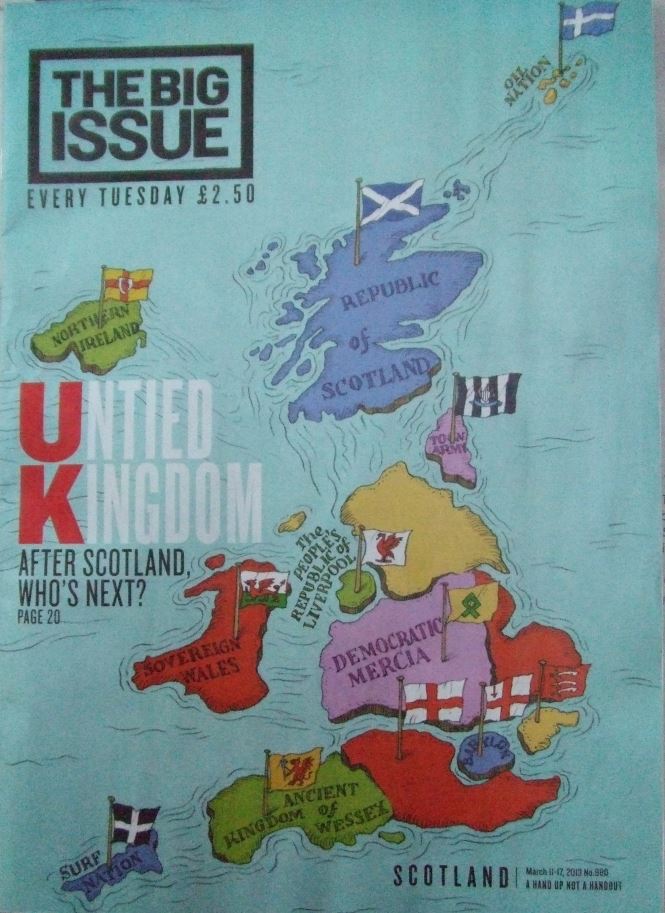
Meanwhile, and irrespective of the outcome in a post-referendum Scotland could we see the internal tensions in the SNP over all the other issues of the day start to break out?
But for Scotland the real irony in all of this is that independence could lead to the type of collapse which will break Scotland which is exactly what Scotland needs. And yet another irony: if, no matter the outcome, a thriving and prosperous future develops, it could drive the nation further and further into godlessness and therefore become more deserving of the judgment which we are now due.
I grieve over the state of my nation, but pray to the God of the nations.
"From one man he made every nation of men, that they should inhabit the whole earth; and he determined the times set for them and the exact places where they should live.
God did this so that men would seek him and perhaps reach out for him and find him, though he is not far from each one of us.
'For in him we live and move and have our being.' As some of your own poets have said, 'We are his offspring.' "Therefore since we are God's offspring, we should not think that the divine being is like gold or silver or stone—an image made by man's design and skill.
In the past God overlooked such ignorance, but now he commands all people everywhere to repent. For he has set a day when he will judge the world with justice by the man he has appointed. He has given proof of this to all men by raising him from the dead." (Acts 17:26-31)
Therefore, you kings, be wise; be warned, you rulers of the earth.
Serve the Lord with fear and rejoice with trembling.
Kiss the Son, lest he be angry and you be destroyed in your way,
for his wrath can flare up in a moment.
Blessed are all who take refuge in him. (Psalm 2:10-12)
Postscript:
When Solomon prayed his prayer of dedication on behalf of himself and the nation, he adopted a recurring theme in his approach to God: "if we will.... will you....?"
In response the Lord assured the King that He would respond positively to the latter's requests. But then God added something that King Solomon hadn’t asked for. The Almighty, in His love and mercy continued:
“....and [I] will heal their land” (2 Chron. chs. 6&7).
See also:
The Origins and Implications of the Scottish Referendum
Addendum: Referendum Result (19/09/14)
The referendum produced an overall 'No' vote (for independence) and as a result, Scotland remains as part of the UK. The "No" side won with 2,001,926 votes over 1,617,989 for "Yes". The 85.6% turnout was the highest in decades.
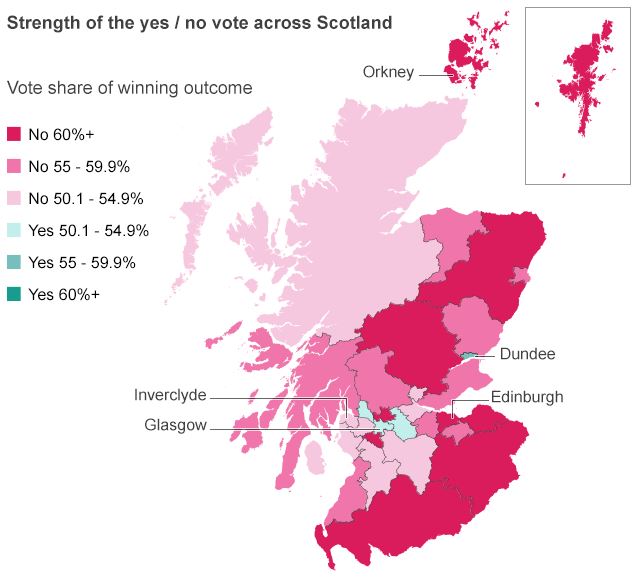
The chart below shows that the areas of Scotland (Northern Isles) and the Borders (represented by the first four rows) had the highest proportion of 'No' votes (shown in red below).
Glasgow is Scotland's biggest city and Edinburgh - the second largest, the capital and the seat of the Scottish Parliament had opposite outcomes. Both of these cities are located in the most populous 'Central Belt' of Scotland. Glasgow produced a 53.49% 'Yes' while the Edinburgh result was a 61% 'No'.
